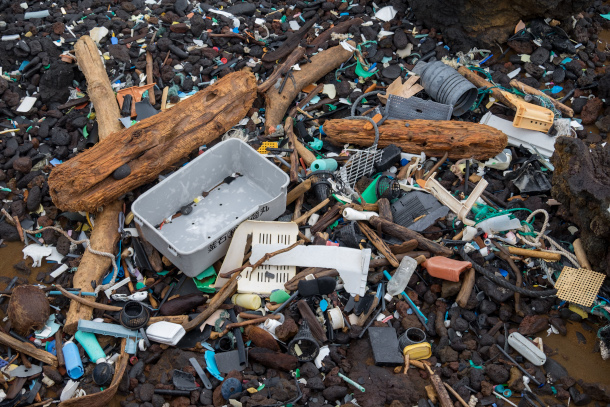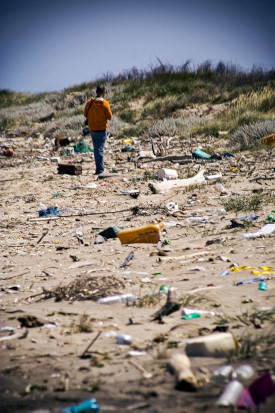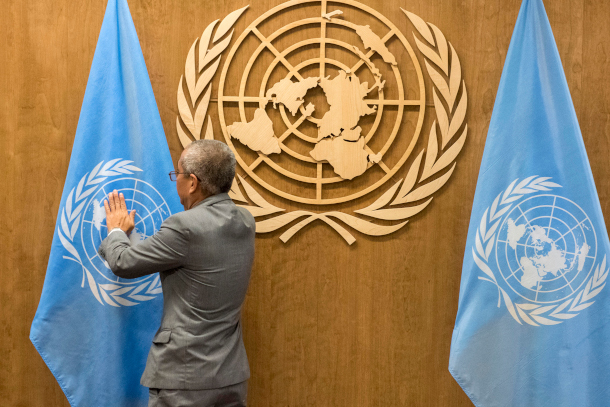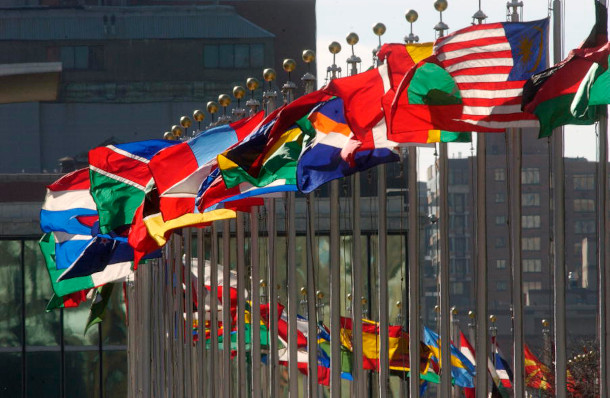Plastics Treaty
Air Date: Week of February 25, 2022

The global community agrees that plastic pollution is threatening our environment. However, many countries have proposed divergent approaches to dealing with this crisis when it comes to crafting an international treaty. (Photo: Justin Dolske, Wikimedia Commons, CC BY-SA 2.0)
The United Nations Environment Assembly is meeting in Nairobi Kenya Feb. 28th - Mar. 2nd to begin drafting a treaty to deal with the millions of tons of plastics that are choking the oceans and marine life. International lawyer and former UN official Kilaparti Ramakrishna, who is now with the Woods Hole Oceanographic Institution, talks with Host Bobby Bascomb.
Transcript
CURWOOD: From PRX and the Jennifer and Ted Stanley Studios at the University of Massachusetts Boston, this is Living on Earth. I’m Steve Curwood.
BASCOMB: And I’m Bobby Bascomb.
The United Nations is drafting an international treaty to deal with the millions of tons of plastic that are choking the oceans and marine life. The UN’s Environment Assembly is meeting in Nairobi, Kenya February 28th to March 2nd to start framing out how such a treaty might work. Fifty-four nations led by Peru and Rwanda and including the EU are calling for a legally binding agreement that would address the full life cycle of plastic. Japan wants the treaty to just address plastic pollution that washes into the oceans, while India says a treaty should only consider single-use plastic with a non-legally binding agreement. It will likely take two or more meetings to hammer out the details, and here to help us sort out what to expect at the first session is Kilaparti Ramakrishna. He’s an international lawyer who has advised the UN about the Climate and Biodiversity treaties and now serves as Senior Advisor to the President and Director on Ocean and Climate Policy at the Woods Hole Oceanographic Institution. Rama, welcome back to Living on Earth.
RAMAKRISHNA: It's great to be back. Thank you.

The plastics industry is drowning our beaches in waste, a colossal challenge that the UN Environment Assembly meeting hopes to address. (Photo: Paolo Margari, Flickr, CC BY-NC-ND 2.0)
BASCOMB: So one of the fundamental questions here is, should this be a binding or non-binding agreement? What’s consequences are there if a country fails to uphold a treaty that they've agreed to to be legally binding?
RAMAKRISHNA: The idea that we need measures that deal with plastic pollution, in the oceans and on land, is broadly recognized. The only question is: binding versus non-binding. If, for example, the United States ratifies an international agreement, that immediately becomes the law of the land. And any violation could be taken up by anybody, any citizen, any civil society groups, can take the United States to court, domestic courts, and seek compliance with it. But we are in a new phase of international governance, where goals are set, and incentives are offered. And if you do that, then you would be able to make progress. Take, for example, the Millennium Development Goals adopted in 2000. And the Sustainable Development Goals adopted in 2015. These are not binding legal instruments by any stretch of imagination. And yet, a lot of progress was accomplished under both of them--you know, not enough by any stretch of imagination--but even without a binding legal instrument, you could make progress. And I think that's where we are at right now. There is going to be a lot of conversation about how this should be a binding legal instrument. But I think we need to sort of move away from that issue as the only determining factor to say whether or not we succeeded in the effort to contain plastic pollution.

With the need to operate by consensus the United Nations often faces criticism for creating non-binding treaties that lack legal “teeth.” Looking toward the UNEA meeting on plastics, Kilaparti Ramakrishna of the Woods Hole Oceanographic Institution suggests that there are alternative ways to evaluate the success of international agreements. (Photo: United Nations Photo, Flickr, CC BY-NC-ND 2.0)
BASCOMB: Well, it's certainly a very complicated topic. Some countries are looking for a stricter model to approach this problem and others want a weaker approach. Where do you see the breakdown there? Like why are different countries taking such different approaches, do you think?
RAMAKRISHNA: It is back to our traditional North/ South divide, because the production and use and disposal historically has been by the industrialized countries. And it is, of course, a cheaper way of doing a lot of things for the developing countries. And in the moment, you start talking about everything that you produce, you need to be able to reuse and etc, it becomes more expensive. So that's where the divide is coming. But at the same time, as has been the case with a number of other agreements that we are talking about, including climate, the developing countries are not saying, we are against doing this, because we want to continue polluting the environment with the cheap plastics. But it's always a question of, well, if you want us to do more and the right way of doing things, we need support. And if you're willing to do that, we can talk about it. But oftentimes, we have these commitments or the pledges, but no actual follow through in terms of helping countries do what they must. And that's where the issue comes.

The United Nations Environment Assembly meets from February 28 to March 2 to discuss the plastic pollution crisis, in the hopes of eventually creating an international treaty. (Photo: United Nation Photo, Flickr, CC BY-NC-ND 2.0)
BASCOMB: Well, to what degree should it maybe not be the burden, so much on developed countries, which, you know, rightfully have created the problem, right, that's where a lot of the plastic is coming from that ends up in our oceans and on our beaches. But, you know, at its root, it's the companies that create it, right? It's the, you know, plastic manufacturers, it's the petrochemical industry that are creating all of this plastic and largely creating it in a way that it's not easily recycled. To what degree do we need to, you know, look to them for a solution and responsibility?
RAMAKRISHNA: Oh, absolutely. Well, interestingly, there are all sorts of alliances being built with petrochemical industry, and you know, those that are major players in the production, use, and disposal of plastics. We have seen statements by companies like Coca Cola and others, subscribing to this. And so there is a lot of good movement, you know, but the thing is, it is impossible to create a crime or an offense retroactively. You know, if it is allowed by law to do the kinds of things that the companies have done, you know, they've done it, you know, so the question is, regulation plays a part and the level playing field makes a, you know, a huge difference. So that is why it is not just enough for a country to try to clean up its act by making sure that the private sector follows the regulations, domestic regulations, fully, because we are living in a heavily globalized society. And, you know, if you don't have these regulations uniformly applied across the board, then you will not have the ability to make the kind of progress that you need to make.

The petrochemical industry, which produces plastics on a colossal scale, is often cited as one of the stakeholders that should be held responsible for the crisis. (Photo: Louis Vest, Flickr, CC BY-NC 2.0)
BASCOMB: Well, what will success look like to you when this meeting is all wrapped up?
RAMAKRISHNA: So if it is a crisis, and we know so much, this body should instruct the intergovernmental negotiating committee clearly what it is that it must include in the agreement. It should also lay out clearly a timeframe by when the agreement should be concluded. I firmly believe that without deadlines, we will not make progress. And most importantly, it should say that the agreement make provision for scientists to work and report on a regular basis in setting baselines and keeping track of the impact of the agreement on various measures, and how to move forward with that.

Kilaparti Ramakrishna is the Senior Advisor to the President and Director on Ocean and Climate Policy at the Woods Hole Oceanographic Institution. (Photo: Green Climate Fund, courtesy of Kilaparti Ramakrishna)
And it should acknowledge the kind of different roles that different regions play, you know, making sure that, you know, I don't want to use the term common but differentiated responsibilities, which is, you know, almost like a Bible for climate negotiators--and do that, and if there is any possibility of not creating the divide between North and South in the treaty text, but make this a global problem and need global solutions. I think that is also a step in the right direction.
BASCOMB: Kilaparti Ramakrishna is Senior Advisor to the President and Director on Ocean and Climate Policy at Woods Hole Oceanographic Institution. Thank you so much for taking this time with me today.
RAMAKRISHNA: Thank you, Bobby.
Links
UN Environment Assembly | “Fifth Session of the UN Environment Assembly-UNEA-5”
Mongabay | “As World Drowns In Plastic Waste, UN To Hammer Out Treaty”
Living on Earth wants to hear from you!
Living on Earth
62 Calef Highway, Suite 212
Lee, NH 03861
Telephone: 617-287-4121
E-mail: comments@loe.org
Newsletter [Click here]
Donate to Living on Earth!
Living on Earth is an independent media program and relies entirely on contributions from listeners and institutions supporting public service. Please donate now to preserve an independent environmental voice.
NewsletterLiving on Earth offers a weekly delivery of the show's rundown to your mailbox. Sign up for our newsletter today!
 Sailors For The Sea: Be the change you want to sea.
Sailors For The Sea: Be the change you want to sea.
 The Grantham Foundation for the Protection of the Environment: Committed to protecting and improving the health of the global environment.
The Grantham Foundation for the Protection of the Environment: Committed to protecting and improving the health of the global environment.
 Contribute to Living on Earth and receive, as our gift to you, an archival print of one of Mark Seth Lender's extraordinary wildlife photographs. Follow the link to see Mark's current collection of photographs.
Contribute to Living on Earth and receive, as our gift to you, an archival print of one of Mark Seth Lender's extraordinary wildlife photographs. Follow the link to see Mark's current collection of photographs.
 Buy a signed copy of Mark Seth Lender's book Smeagull the Seagull & support Living on Earth
Buy a signed copy of Mark Seth Lender's book Smeagull the Seagull & support Living on Earth

